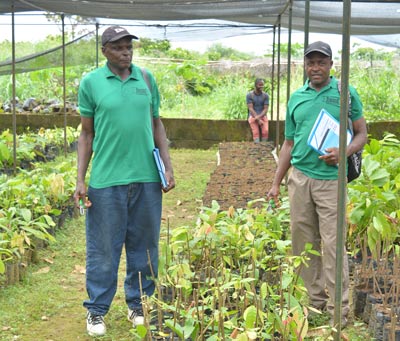The gender gap in agriculture is a pattern, recognized worldwide; in which women compared to men have less access to productive resources, financial capital and to advisory services. This gap affects how men and women access and benefit from Climate Smart Agriculture (CSA). Men and women, due to socially-constructed gender roles, are vulnerable to climate change in different ways and have diverse methods of coping to ensure food security.
This study sought to assess gender roles in Climate Smart Agriculture and highlights the different adaptation and mitigation options available for each gender group. This topic has relevance because climate change does not affect everyone in the same way: women in rural areas experience the effects of climate change more acutely due to gender inequalities and structural disadvantages.
A baseline household survey was undertaken between September 2019 and February 2020. Ten smallholder farm households were randomly drawn from six preselected farmers’ associations, from each of the six divisions of the South West Region of Cameroon (Fako, Meme, Ndian, Koupemanenguba, Manyu and Lebialem). This made a sample of 60 households. The main instruments used were structured questionnaire with personal interview and focus group discussions.
It was found that men and women experience changes in climate differently. Gender differences are also reflected in men and women’s educational level, with male farmers being more educated than their female counterparts. While there are many similarities between men and women, there exist significant differences in their level of awareness about climate change and adaptation options. The survey showed that up to 60% of women and 36% of men have never heard about climate change. Of those who are aware of climate change, men’s predominant source of information was television and radio while for women’s was cooperative groups. Both men and women rely on institutional support to cope with climate risks but have different levels of access: for example, women, unlike men do not interact with extension agents.
Coping strategies used in this region of the country include agroforestry, mixed cropping, irrigation and composting. Women adopt mixed cropping as their main coping strategies while men prefer agroforestry. Because women lack access to capital and other resources, their decisions about what they grow are more limited.



Given that women are receiving significantly less information on CSA practices and typically rely on male household members and cooperative groups to get information, bringing together extension services, researchers and NGOs/practitioners centered on improved climate services can enhance their adaptive capacity and resilience. Therefore, the integration of adaptation approach within extension strategy is relevant for gender to address climate change.
Rural Advisory Service providers, by working in close collaboration with female farmers can play a major role in supporting their adoption of CSA practices through: technology development and information dissemination, strengthening farmers’ capacity, facilitation and brokering, advocacy and policy support.


